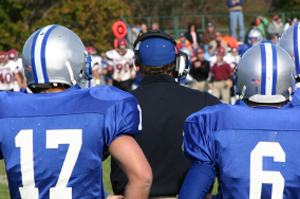Ron Prince began his coaching career as a volunteer assistant coach at Dodge City Community College working with offensive tackles and tight ends. In 1993, Prince received his first full-time coaching position at Alabama A&M. Following one year at Alabama A&M, Prince made multiple coaching stops at South Carolina State, James Madison, Cornell, and Virginia before getting the coaching break of his career. In late 2005 Prince was named the head football at Kansas State University (KSU). Prince inherited a team from the most successful coach in KSU history, Bill Snyder. In 2006 Prince led the Wildcats to a winning record of 7-6 and a bowl game berth, and followed up that season with two successive losing seasons of 5-7, finishing with a final coaching record of 17-20. Prince was terminated by KSU after the 2008 season (effective Dec. 31, 2008), triggering litigation that would divide the university, its employees, and its supporters.
college coaching agreements
Coaching Free Agency Has a Price – Liquidated Damages Upheld in the Geno Ford Kent State Case
Gene “Geno” A. Ford went into coaching after his years in college, taking a job as an Ohio assistant coach. In 2007-2008 he was appointed as an assistant coach at Kent State University (Kent State) and became the head basketball coach of Kent State in 2008. On or about April 1, 2008, Ford and Kent State entered into their initial Employment Contract which was for a four year term with an option for a fifth year by mutual agreement of the parties.
Coach Accountability Reduces Vicarious Liability
Head Coach Accountability - New Standard. In October of 2012, NCAA Bylaw 11.1.2.1 was created to read as follows: It shall be the responsibility of an institution's head coach to promote an atmosphere for compliance within the program supervised by the coach and to monitor the activities regarding compliance of all assistant coaches and other administrators involved with the program who report directly or indirectly to the coach. As a result of NCAA Bylaw 11.1.2.1, an institution's head coach is presumed to be responsible for the actions of all assistant coaches and administrators who report directly and indirectly to the head coach. Under the new Bylaw, a head coach is required to cultivate an atmosphere of compliance within his program and to monitor the activities of all assistant coaches and administrators involved with the program who report directly or indirectly to the head coach. The new legislation holds head coaches directly accountable for NCAA violations by members of their coaching staff.
CEOs in Headphones – POSTSCRIPT
College coaches' contracts for public institutions, unless limited by some state law exception, are open to the public for review. By making an open records request, universities will provide copies of coaches' contracts and any amendments thereto. From a review of the coach's contract and what is reported by the coach to the university with respect to athletically related income, plus a determination as to whether bonuses prescribed were achieved, one could come to a fairly good understanding of what a coach's total compensation package approximates.
The Defense of Sovereign Immunity: Mike Leach and Texas Tech
Mike Leach became Texas Tech University’s (TTU) 14th head football coach in 2000 replacing “Spike” Dikes. When Leach arrived at TTU, the program was on probation and the graduation rate was below average. During his time at TTU, Leach had a winning record of 84-43, making an appearance at a bowl game each year. In 2008, he won a slew of awards including the George Munger Award, the Woody Hayes Trophy, Big 12 Coach of the Year, and the FieldTurf/Howie Long Coach of the year. Additionally, the Red Raiders were the Big 12 South Division Champions in 2008. When Leach left, he was the all-time winningest coach in postseason play at TTU. Leach led TTU to ten straight bowl games and the highest graduation rate for football players from a public institution in the country. Leach served until December 28, 2009 when he was suspended indefinitely and then fired two days later. Ruffin McNeill, TTU’s defensive coordinator, was named as the interim head coach and led the team during the Alamo Bowl. Tommy Tuberville is currently the coach at TTU. Leach became the head football coach of Washington State University on November 30, 2011, and commenced his career at Washington State starting with the 2012 season. He has a five-year rollover contract which makes him the 4th highest paid coach in the PAC 12.
Take My Coach and I’ll Take You To Court
On March 26, 2008, Matt Brady became the men’s basketball coach at James Madison University (JMU). He was formerly the head coach at Marist College, compiling a 73-50 record in four years. Marist is a private institution located in Poughkeepsie, New York. Brady was employed pursuant to a head coaching contract with Marist that was entered into on July 1, 2007 and was to expire on March 31, 2011. Brady’s contract contained two covenants with respect to termination of employment that are the subject of this article. In the first instance, Brady was precluded from entering into any employment discussions with any other collegiate or professional basketball program and from accepting a head coaching position with any program without the prior written consent of Marist. In addition, if Brady’s contract was ultimately terminated for any reason, including Brady accepting another coaching position pursuant to such written consent, Brady agreed to (1) return all basketball program records and files, (2) end any and all contact with Marist basketball program recruits, and (3) not offer a scholarship to current Marist basketball players nor any persons that he or his staff recruited to play basketball at Marist.





